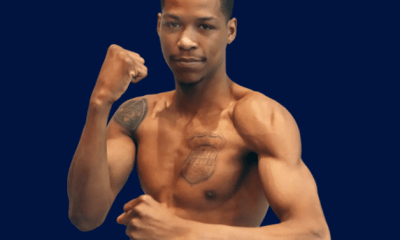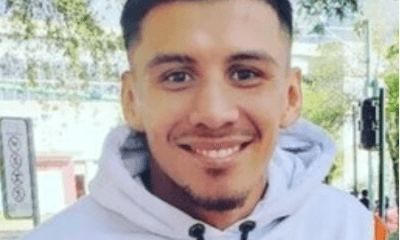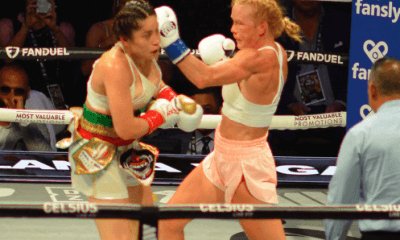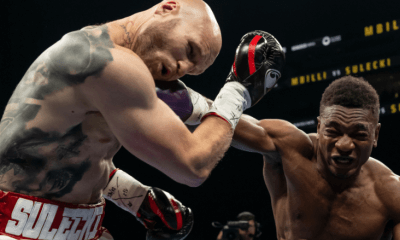Featured Articles
The Hauser Report: Triller at Madison Square Garden
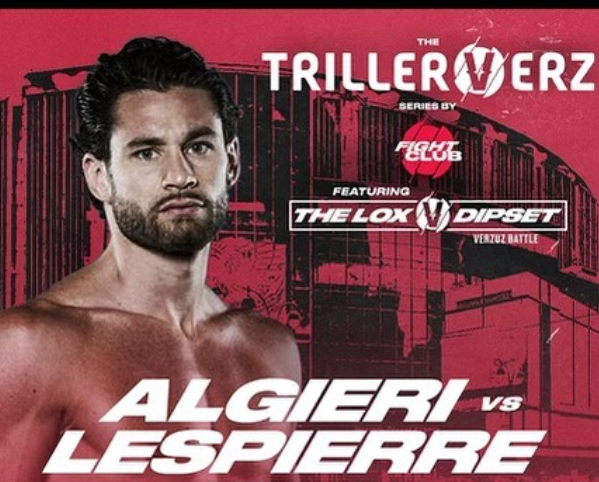
On Tuesday, August 3, I went to the fights for the first time in seventeen months. The occasion was the inaugural TrillerVerz event at Madison Square Garden – a nine-bout card followed by a hip-hop “rap battle.”
On July 1, it was reported that Triller would present twelve monthly shows at the Hulu Theater at Madison Square Garden beginning on August 3, 2021. Each event would consist of a regular live boxing card followed by a TrillerVerz music battle. A subsequent press release stated that these events would take place on the first Tuesday of each month and be streamed on FITE.TV and other platforms.
Boxing is a vehicle of opportunity for Triller. The company is selling what it calls a “four-quadrant model” consisting of “influencers, legends, music artists and contemporary fighters.” During the past year, it has sought to build its brand by blending the sweet science with contemporary urban music. It’s greatest success to date was a November 28, 2020, event featuring an exhibition bout between Mike Tyson and Roy Jones paired with performances by Wiz Khalifa, French Montana, YG, and Snoop Dogg. Other Triller events have been less commercially successful, and Triller has struggled to find a formula that will give it an adequate return on its $6,018,000 purse bid for a lightweight title-unification bout between Teofimo Lopez and George Kambosos.
The Garden gave Triller a good deal on rent for TrillerVerz and pushed for the involvement of a local promoter to oversee the boxing end of the promotion. DiBella Entertainment was hired to perform the nuts-and-bolts, on-site duties. In return, it received slots on the card for four of its fighters – Mikkel LesPierre, Eric Walker, Ivan Golub, and Joe Ward.
Explaining the series, Ryan Kavanaugh (the driving force behind Triller) proclaimed, “It’s about continuing to build our customers as well as to continue to deliver what they want. Pay-per-view is one way to make money but that is for big, big events. In the meantime, we need to build up our fighters and image. The idea is to have a series leading up to our big PPV events.”
There are a lot of questions that can – and should – be asked about Triller, its financial underpinnings, its ever-changing business model, and Kavanaugh. These questions are for another forum. This article is about a return to ringside after a long absence occasioned by the pandemic and what it felt like for this writer to be on the boxing scene again.
Tickets for the August 3 TrillerVerz show went on sale on July 15 with five hundred tickets held in reserve as comps and for sale to the fighters and their camps. Within hours, every ticket available to the public had been sold. The music, not the fights, drove the promotion.
There was confusion surrounding the start time for the event. Initially, the media was told that the first fight would begin at 6:05 PM. Then, on August 2, a 4:05 PM start time was finalized with a 7:00 PM start for the streaming portion of the fight card. The rap battle would commence around 9:30 PM.
I arrived at Madison Square Garden at 3:45 PM, the same time as Gerry Cooney (who co-hosts a radio show devoted to boxing). Gerry and I are friends and try to sit next to each other at fights. Toward that end, the first thing Gerry did on arriving at The Theater was rearrange the seating labels on press row so we could sit together.
The specter of COVID-19 and its variants hung in the air. Media and spectators had been told in advance that, to be allowed entry, they had to be fully vaccinated and provide proof of having received their final dose no later than fourteen days prior to the event. All Madison Square Garden personnel on site had to be vaccinated. New York State Athletic Commission personnel were required to wear masks but there was no requirement that they be vaccinated. Everyone in the technical zone at ringside wore masks. Virtually none of the spectators were masked. With close to five thousand people in attendance by evening’s end, it was a statistical certainty that some of the spectators were COVID-positive.
Gerry and I wore our masks throughout the night. Security was tight, and I missed being able to move around freely from area to area to schmooze with friends. But as the evening progressed, I was able to chat with Michael Buffer, Lou DiBella, Keith Idec, and others.
The first fighters – junior-middleweights Nikoloz Sekhniashvili and Guido Schramm – entered the ring at 4:00 PM. When the bell for round one sounded, there were two dozen spectators in the stands. Schramm won a unanimous decision. Then Robert Sabbagh decisioned an overweight, out-of-shape Cleveland Billingsly in a four-round heavyweight contest, and light-heavyweight prospect Matthew Tinker stopped sacrificial lamb Michael Rycraft in two rounds. There was little crowd response. Of course, there was little crowd.
Next up, flyweight Cristina Cruz won her pro debut against Indeya Smith. BoxRec.com credits Cruz with a 93-39 amateur record and three knockout victories in 132 fights. It was hardly a surprise that the bout went the distance.
The best fight of the evening – on paper and in the ring – came next: Eric Walker (20-3, 9 KOs) vs. Ivan Golub (19-1, 15 KOs) in a welterweight match-up. It was 5:30 PM when the bout began. Golub dropped Walker twice en route to a ten-round unanimous decision triumph. Then light-heavyweight Joe Ward decisioned Tory Williams.
At 7:00 PM, the Triller stream began with junior-welterweight Aaron Aponte knocking out Gerardo Gonzalez in the second stanza. The Theater was still two-thirds empty.
Then came the first co-featured fight of the evening, Chris Algieri (24-3, 9 KOs, 1 KO by) vs. Mikkel LesPierre (22-2-1, 10 KOs) at a 143-pound contract weight.
There was a time when Algieri was willing to go in tough. His career peaked in 2014 when he overcame two first-round knockdowns and a badly damaged eye to win a split decision over Ruslan Provodnikov and claim the WBO 140-pound title. But he lost by decision in his next outing when he was knocked down six times by Manny Pacquiao. Defeats at the hands of Amir Khan and Errol Spence followed. Since then, Algieri has sought out less threatening opposition. LesPierre met that criteria.
Early in the fight, it became clear that the bout was likely to go ten dreary rounds. And it did. Neither guy is a puncher. But Algieri was stronger physically, and LesPierre fought like he was just mailing it in. The final scorecards read 100-90, 100-90, 99-91 in Chris’s favor.
Now the arena was filling up. But these were hip-hop fans, not fight fans. In essence, the fights were an opening act for the rap artists to follow
Michael Buffer took over ring announcing duties from Mark Fratto for the main event – Michael Hunter vs. Mike “White Delight” Wilson in what was styled as a ten-round WBA title-elimination bout. For the first time in memory, Buffer’s classic intonation of “Let’s get ready to rumble” failed to elicit a roaring Pavlovian response. This wasn’t a boxing audience.
Hunter (19-1-1, 13 KOs heading in) is a credible heavyweight. But he has fallen short each time he stepped up the level of competition, losing as a cruiserweight to Oleksandr Usyk and fighting to a draw in the heavyweight ranks against Alexander Povetkin.
Wilson, despite his 21-1 (10 KOs) record, was a safe opponent. His most credible credential was that he’d gone the distance, losing eleven of twelve rounds against Denis Lebedev three years ago. One could make the case that he’d never even beaten a good club fighter. He weighed in for Hunter at 224 pounds, 26 pounds more than for his most recent fight.
Wilson came to fight but didn’t know how. He’s tough. But at a certain level, that’s not nearly enough. In round four, with “White Delight” reeling like a heavy bag getting hit by a precision puncher, Hunter ended matters with a straight righthand up top.
At 8:30 PM, a Madison Square Garden maintenance crew began breaking down the ring and setting up a stage for the music to follow. On July 1, hip-hop fans had been told that N.O.R.E. and Beanie Sigel would square off in the August 3 TrillerVerz Rap Battle. But on July 14, that was changed to The Lox vs. Dipset.
If Little Richard vs. Fats Domino had been on the bill, I would have hung around. But their voices were stilled a long time ago, so I put away my pad and pen and went home.
Earlier in the evening, tickets for the event had been scalped on the streets outside the Garden and there were reports that some would-be spectators had tried to storm one of the entrances to the arena. As I was leaving The Hulu Theater, a security guard stopped me and said, “You might want to take off your [press] credential so someone outside doesn’t rip it off your neck.”
Thomas Hauser’s email address is thomashauserwriter@gmail.com. His next book – Broken Dreams: Another Year Inside Boxing – will be published by the University of Arkansas Press this autumn. In 2004, the Boxing Writers Association of America honored Hauser with the Nat Fleischer Award for career excellence in boxing journalism. In 2019, Hauser was selected for boxing’s highest honor – induction into the International Boxing Hall of Fame.
Check out more boxing news on video at the Boxing Channel
To comment on this story in the Fight Forum CLICK HERE
-

 Featured Articles3 weeks ago
Featured Articles3 weeks agoAvila Perspective, Chap. 330: Matchroom in New York plus the Latest on Canelo-Crawford
-

 Featured Articles2 weeks ago
Featured Articles2 weeks agoVito Mielnicki Jr Whitewashes Kamil Gardzielik Before the Home Folks in Newark
-

 Featured Articles4 weeks ago
Featured Articles4 weeks agoAvila Perspective, Chap 329: Pacquiao is Back, Fabio in England and More
-

 Featured Articles3 weeks ago
Featured Articles3 weeks agoOpetaia and Nakatani Crush Overmatched Foes, Capping Off a Wild Boxing Weekend
-

 Featured Articles2 weeks ago
Featured Articles2 weeks agoCatching Up with Clay Moyle Who Talks About His Massive Collection of Boxing Books
-

 Featured Articles4 weeks ago
Featured Articles4 weeks agoFabio Wardley Comes from Behind to KO Justis Huni
-

 Featured Articles1 week ago
Featured Articles1 week agoMore Medals for Hawaii’s Patricio Family at the USA Boxing Summer Festival
-

 Featured Articles4 weeks ago
Featured Articles4 weeks agoDelving into ‘Hoopla’ with Notes on Books by George Plimpton and Joyce Carol Oates

